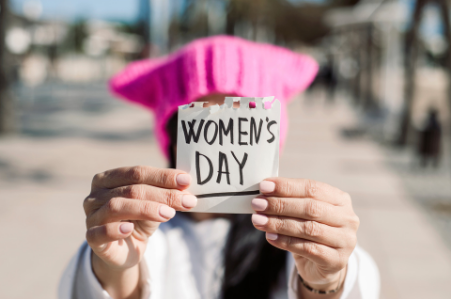
March 8, 2021
International Women’s Day at Dixon Hall
Throughout the COVID-19 pandemic, time has been funny: it’s been difficult to know what day of the week it is (hopefully Friday); it’s been hard to know for certain whether or not you need to get dressed (probably not); and it’s taken some extra effort to note and mark all the days we should.
March 8, International Women’s Day, is a day for all of us to notice. And from where I’m sitting, as part of Philanthropy & Communications at one of Toronto’s oldest multi-service agencies, there are reasons to pause on this date, one that is meant to be both a celebration of the achievements of women, and a call to action for gender equity.
At Dixon Hall, we have reason and room for both celebration and action.
Dixon Hall offers a range of programs to support the most isolated and marginalized in downtown East Toronto. Given the populations we serve and how we engage them, I was interested in learning about the number of women supported by the agency and thinking further on what those numbers reveal about how we are supporting women.[1]
Simply looking at the numbers, it would seem like women do not play a large role in the homelessness/housing crisis in the City of Toronto. Women are underrepresented in Dixon Hall’s emergency housing programs; currently, only 92 out of the 503 beds in our emergency shelter sites are occupied by women. This absence of women, I would suggest, is not a good thing.
As one source points out: “During the COVID-19 pandemic, women, girls, and gender diverse people who have complex health needs require interventions grounded in policies that intentionally respond to the intersections between housing and health. The multiple and compounding systemic failures that perpetuate homelessness are exacerbated by the pandemic. … The ad-hoc interventions fall considerably short in terms of supporting women with complex mental health, addiction issues, or experiences of violence.”[2]
It is not that women are not homeless in Toronto, it is that the solutions being made available during the COVID-19 pandemic (and before) are not necessarily able to meet the needs of many women experiencing homelessness. In fact, these challenges present “a unique opportunity to re-envision a more just social welfare state; one in which all women, girls, and gender diverse-people have access to safe, adequate, and sustainable housing.” [3]
From our Employment Services numbers, I learned that from 2017/18 to 2020/21, we saw a 10% increase in the number of women accessing our basic employment programs. That means an increasing number of women are reaching out to us for supports in accessing the employment market. And those numbers are barely beginning to register the number of women who The pandemic might have impacted.
We know that the pandemic has had a profoundly negative impact on women’s economic and employment health in general: it was reported this week that 10 times more women than men have fallen out of the labour force since February.[4] We also know that “women in racial minorities are bearing the brunt of the pandemic slump.”[5] Our already high client numbers are likely going to get higher as we work to support women entering or re-entering the workforce.
Finally, I turned to our Seniors Services to see what information from this department would tell me. I discovered that a vast majority of our clients – currently 68%, are women. That means that we are currently supporting 734 vulnerable and isolated women who are seniors in downtown East Toronto. The pandemic has shone a light on many of our seniors’ vulnerability and precarity in Toronto and beyond. Those being served by Dixon Hall, including a disproportionate number of older women, are in need of support, food, and companionship, among other things.
While Dixon Hall is not a women’s organization, we are working to build a city where everyone thrives. And that cannot be done without extra consideration placed on questions of equity – and in particular, around gender, race, and sexual orientation.
There is still work to be done on the road to gender parity. For Dixon Hall, it can start very close to home by attending to how our supports and programs for women could look different or could be customized. We will work towards these objectives as we implement a new 5-year strategic plan: this is the perfect opportunity to use what our numbers tell us about women to inform meaningful change, and choose to challenge what isn’t working for women.
International Women’s Day is also a moment to celebrate, so here is something else I learned from our numbers — 61% of Dixon Hall’s leadership and management team are women. Dixon Hall’s staff team is, in fact, 66% women. That number of strong, confident women committed to social change is certainly worth acknowledging, and taking pride in. (There is still room for improvement on our Board of Directors, as we continue to fall short of gender parity in that context.)
So let us pause on March 8 to both celebrate and renew our commitment to gender parity. We need to recognize that even as we work on Dixon Hall’s mission to create lasting solutions to end poverty, social injustices, and isolation in Toronto, these experiences look different for women and require different responses.

